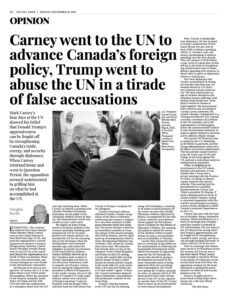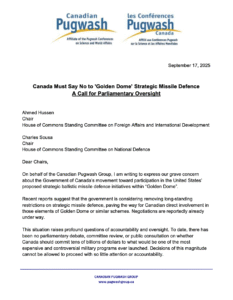 The author is a member and past Chair of Canadian Pugwash Group
The author is a member and past Chair of Canadian Pugwash Group
Published in The Hill Times, September 29, 2025
Mark Carney’s four days at the UN showed his belief that Donald Trump’s aggressiveness can be fought off by strengthening Canada’s trade, energy, and security through diplomacy. When Carney returned home and went to Question Period, the opposition seemed uninterested in grilling him on what he had accomplished at the UN.
EDMONTON—The contrast could not have been sharper. Prime Minister Mark Carney went to the United Nations in New York from Sept. 21-24, and used the organization’s convening power to advance Canada’s foreign policy interests. United States President Donald Trump went to the UN for a few hours and abused the organization in a tirade of false accusations. These two story lines intersected, and Carney emerged as a new leader in the international community.
All this has to be seen in perspective. Of course, the U.S. is the giant whose every twitch grabs the headlines. When the escalator to the General Assembly broke down on Trump and his wife, CNN led with this malfunction as a metaphor about how the UN can’t get anything done. When Carney co-chaired a meeting with Ukraine President Volodymyr Zelenskyy on the plight of the Ukrainian children stolen by Russia, this humanitarian action was treated as just a side event.
For nearly an hour, Trump stood at the green podium in the General Assembly belittling and berating the UN for its immigration and climate policies. He mocked the UN for not choosing him as the developer when the headquarters was renovated decades ago, and treated the delegates as merely an extension of his usual MAGA audience. Carney dutifully showed up at the Canadian desk to listen to Trump’s harangue and later, at his own press conference, tried to smooth over Trump’s viciousness by saying he supported the president’s efforts to bring peace to the world. Carney, who is in the midst of Canada-U.S. trade negotiations, seems very conscious of Trump’s warning, “I only do business with the people I like,” and later took his wife Diana Fox Carney to Trump’s reception for the delegates.
Carney’s principal address affirmed Canada’s formal recognition of the State of Palestine, reinforcing this country’s support for a two-state solution to build peace between Israel and Palestine. The prime minister called for an immediate ceasefire in Gaza, the release of the Israeli hostages still held by Hamas, and the rapid scale-up of humanitarian relief in Gaza. Recognizing Palestine was certainly a late action by Canada, since more than 150 countries had already done so, but in the company of the United Kingdom and France in this UN setting, Carney felt comfortable moving ahead, despite Trump’s veiled threats he would punish Canada in the trade talks for such action. Only a few days previously, the U.S. had vetoed—again—a Security Council resolution demanding an immediate, unconditional and permanent ceasefire in the Gaza Strip.
Carney’s shining moment at the UN was his co-chairing, along with Zelenskyy, a meeting of 42 states to build pressure for the return of more than 20,000 Ukrainian children abducted by Russia. Accompanied by his wife, Carney called for more international support for the International Coalition for the Return of Ukrainian Children. The meeting laid plans to embed the return of the children within broader efforts for peace, reconciliation and accountability in Ukraine.
Carney then turned his attention to a meeting of specialists on the technicalities of achieving the Sustainable Development Goals, which has become an agonizing issue for the UN because the money that should be going to development processes in the most vulnerable states is being siphoned off by the escalating arms expenditures. The world now spends $2.7-trillion annually on arms, an amount which is 750 times greater than what nations devote to the UN. In his capacity as current chair of the G7, Carney tried to shore up the mechanisms to boost human development.
Here, Carney is doing high-wire diplomacy. He has acceded to Trump’s demand that NATO states devote five per cent of their GDP to defence spending, which, in Canada’s case, will mean a quadrupling of defence spending over the next decade. This will amount to $150-billion a year. Even if a good slice of this will be in the form of strengthening infrastructure here at home, defence spending will continue to dwarf what is spent on diplomatic efforts to build peace.
Yet it was diplomacy that Carney concentrated on during his four-day New York stay. He seemed moved by UN Secretary-General Antonio Guterres’ cry, “We have entered into an age of reckless disruption and relentless human suffering,” and leaders must decide now “what kind of world we choose to build together.” He met privately with Guterres and, according to Carney’s press statement, discussed Canada’s commitment to a “strong and effective” UN. Canada currently contributes $2.2-billion to the UN annually, and is the organization’s seventh-largest donor. He announced $207-million in new international assistance to improve global children’s nutrition and to address climate change.
The current UN financial crisis is caused by the U.S. defaulting on $1-billion in payments, and the Trump administration’s plans for a $1-billion cut in future assessments. This has already caused Guterres to lay off 15 per cent of UN staff. Trump, in his tirade against the UN, said not a word about America cutting back its payments.
China is stepping up its involvement in the UN administration and outreach. It was notable that Carney had a private meeting with the Premier of China, Li Qiang, to discuss canola, seafood and electric vehicles. This meeting laid the groundwork for a possible summit between Carney and China’s president Xi Jinping. If such a meeting were to occur, it would confirm Canada’s swing to renewed cooperation with the world’s second-largest economy, a move clearly designed to offset Canada’s economic dependence on the U.S.
Carney also met with the leaders of Namibia, Kenya, Barbados, Jamaica, Haiti and Malaysia in a burst of meetings that strengthened this country’s network of UN relationships. His four days at the UN showed his strong belief that Trump’s aggressiveness can be fought off by strengthening Canada’s trade, energy, and security through building networks of action with the UN at the core.
That is a message that desperately needs to be broadcast across the country, but I’m not sure it has been heard. When Carney went straight to Question Period in the House of Commons on his arrival back from New York, the opposition seemed not the least interested in grilling the prime minister on what he had accomplished at the UN.
Senator Douglas Roche’s latest book is Keep Hope Alive: Essays for a War-free World (Amazon).
The Hill Times


 The author is a member and past Chair of Canadian Pugwash Group
The author is a member and past Chair of Canadian Pugwash Group